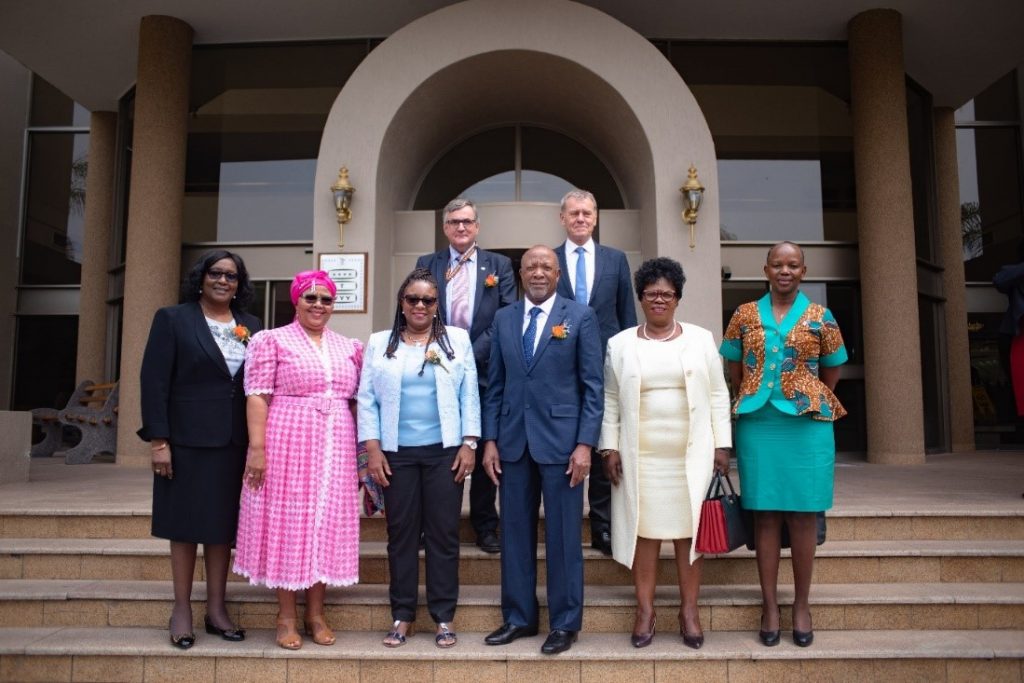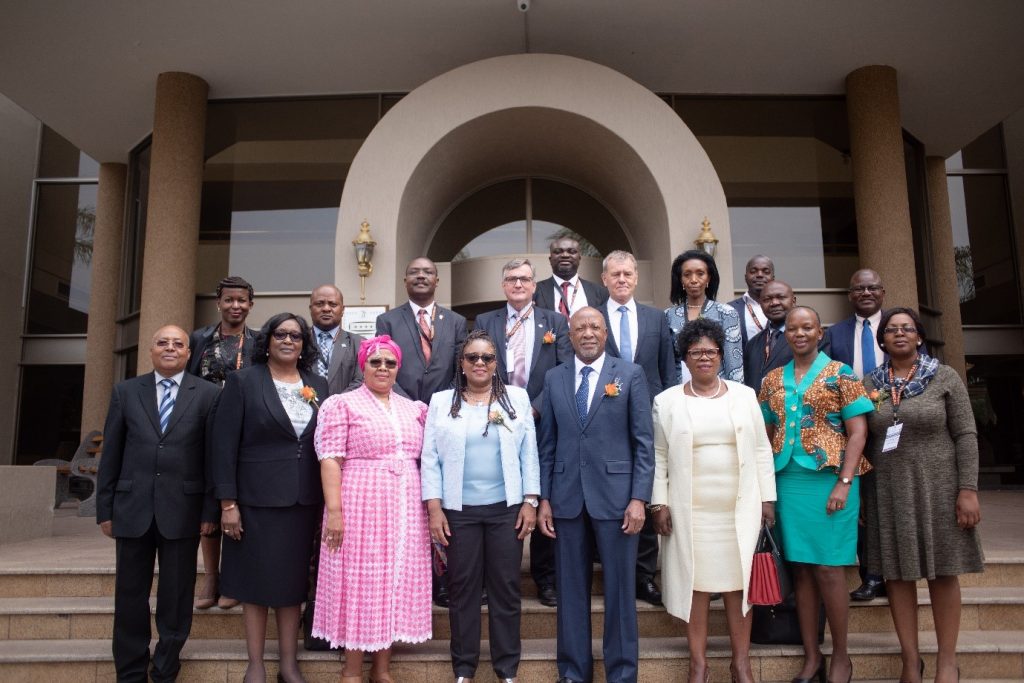The SASSCAL unprecedented first Ministerial Meeting was held in Windhoek on Friday, 21 September 2018. The meeting was held under the theme ‘Promoting Science for Sustainable Development’.
Mr Abraham Nehemia, the Namibia alternate SASSCAL Board Member and Deputy Permanent Secretary in the Ministry of Agriculture Water and Forestry, in his remarks as the Master of Ceremonies noted that the meeting was a landmark event in the history of the organisation and a critical milestone.
SASSCAL Executive Director Dr Jane Olwoch thanked the delegates and the Council of Ministers for prioritising and availing themselves for the meeting. Dr Olwoch took the delegates through the journey of SASSCAL, what it is, what SASSCAL has done and its aspirations through the unveiling of the ‘SASSCAL- Promoting Science for Sustainable Development” video.
The meeting was officially opened by His Excellency, the Vice President and Acting President of the Republic of Namibia Dr Nangolo Mbumba. In his opening address, Dr Mbumba highlighted the effects of climate change that are being experienced in the region and their impact on African ecosystems and economies. SASSCAL’s initiative is most opportune as it generates the scientific knowledge, techniques and skills that are required to minimise and mitigate the impact of climate change in the region as a whole, he added. He also informed the delegates that SASSCAL serves as a regional scientific advisory, information services and adaptive land management centre.

Front row: From left: Hon Anna Shiweda – Deputy Minister MAWF (SASSCAL Deputy Board Chair), Hon Katrina Hanse Himarwa – Minister of Education Namibia, Hon Maria Do Rosario Sambo – Minister of Higher Education, Science Technology and Innovation Angola, Dr Nangolo Mbumba – His Excellency Vice President of the Republic of Namibia, Hon Prof Nkandu Luo- Minister of Higher Education Zambia, Her Excellency Tshenolo Modise – Botswana High Commissioner to Namibia.
Back Row: From left: Dr Wilfried Kraus – German Federal Ministry of Education and Research (BMBF) representative, Dr Thomas Auf Der Heyde, Deputy Director General Research Development and Support South Africa
Angola
Hon Maria Do Rosario Sambo the Angola Minister of Higher Education, Science Technology and Innovation in her statement noted that “today SASSCAL is an unquestionable evidence of multilateral scientific cooperation between the member states and Germany”. She added that “for Angola, it is a great advantage to be part and actively participate in the SASSCAL initiative. Hon Sambo highlighted some of the benefits her country has attained from SASSCAL and these included:
- 19 scholarships (2 PhD, 12 master’s degrees and 5 undergraduate degrees)
- 13 scientific research projects
- 18 automatic meteorological stations
- Recovery of 21 automatic meteorological stations
- Various institutions laboratories have been equipped
- 6 biodiversity observatories were established
Hon Sambo informed the delegate on her country’s commitment to honour its financial obligation to SASSCAL to guarantee its sustainability.
Hon Sambo challenged SASSCAL to ensure that the scientific research impact communities. This can be in the form of low cost technologies to mitigate problems related to SASSCAL 1.0 thematic areas she added.
Botswana
The Botswana High Commissioner to Namibia, her Excellency Tshenolo Modise delivered a statement on behalf of the Minister of Environment Natural Resources Conservation and Tourism Hon Tshekedi Khama. In the statement Hon Khama stated that Botswana is a drought prone country and is therefore imperative that SASSCAL 1.0 research is made actionable to mitigate and minimise the most severe impacts of climate change. Hon Khama informed the delegates that the Botswana node has made significant progress in supporting problem oriented research with high potential for impact. Benefits accrued include:
- 14 projects
- 16 institutions involved in projects implementation
- Launch of the collaborative Master Degree in Earth Observation, GIS and Remote Sensing
- 59 scholarships (4 PhD, 17 Master’s students, 30 Bachelor, 8 Certificate level)
- 25 Technicians received specialised training
- 20 automatic weather stations
- Procurement of IT, laboratory and field equipment.
The Botswana node has contributed immensely in improving linkages between research and policy noted Hon Khama. He pledged to ‘utilise availed resources and knowledge to make sound policies with scientifically informed knowledge’. Hon Khama informed the delegates that SASSCAL 2.0 should see the establishment of effective knowledge translation platforms.
Namibia
Hon Alpheus !Naruseb the Mister of Agriculture, Water and Forestry in a statement read on his behalf by the SASSCAL deputy Board chairperson and Deputy Minister Hon Anna Shiweda noted his satisfaction of SASSCAL’s accomplishments since its establishment. These include:
- 18 research projects
- 31 institutions involved in project implementation
- 58 automatic weather stations, 9 FogNet stations, 9 rain gauge stations and 20 surface water data loggers
- 107 scholarships (10 PhD, 60 Master students, 25 Honours students and 12 Bachelor students)
- Launch of the collaborative Master Degree in Earth Observation, GIS and Remote Sensing
Hon !Naruseb informed the delegates that Namibia has availed land for the construction of the Regional Secretariat which is based in Windhoek as well as the Namibia node offices.
South Africa
Dr Thomas Auf Der Heyde who represented the Minister of Science and Technology Hon Mmamoloko Kubayi-Ngubane painted a very vivid picture of the challenges of climate change in the region. Human induced climate change is a major challenge facing society, economy and natural systems stated Dr Auf Der Heyde. He added that it constitutes a particular threat to rural and poor communities that depend on natural systems for sustainability. Such challenges should be jointly addressed and thus applauded the regional initiative.
South Africa regards as very important its contribution to national, regional and international efforts to combat climate change and thus welcomed the SASSCAL initiative. Dr Auf Der Heyde emphasised on the need to understand where our greatest vulnerabilities are, and begin with those. Land-use, agriculture and rural communities receive high priority and it in this context that South Africa supports the SASSCAL initiative.
SASSCAL serves many very important purposes noted Dr Auf Der Heyde. Some of these are:
- Multi-lateral programme which is an important expression of science diplomacy
- It brings together various parties in pursuit of climate change solutions
- Harnessing the power of science and technology to assist the region to understand climate change impacts so as to minimise its negative consequences.
- Strengthen regional scientific endeavours, competencies and technologies and infrastructural platforms.
- Human capacity development
- Enhances the region’s international scientific profile.
Dr Auf Der Heyde also acknowledged SASSCAL 1.0 achievements in South Africa from the 5 big projects implemented. These included human and institutional capacity developments and investments.
Zambia
Hon Prof Nkandu Luo the Minister of Higher Education acknowledged the importance of SASSCAL to the region because of the pivotal roles climate change and land management play in the regional development process. Hon Luo highlighted some of the recent effects of climate change in the region and their impacts which include reduced productivity in the agricultural sector. She advised the delegates of reforms to strengthen science and technology, research and innovation that have been introduced by her ministry. “This means that SASSCAL agenda falls squarely within the development agenda of Zambia” she added.
Hon Luo informed the delegates that Zambia places a very high premium on the success of SASSCAL as a regional body because of her country aspirations for industrialization. “It is therefore important for Zambia to keep an eye on prudent resources and climate change management in order to ensure sustainable development” she added. Zambia is pleased with the progress and achievements of SASSCAL 1.0 which include:
- Capacity development in climatology where curricula has been developed and training in Zambian Universities
- Generation of information which is vital for evidence-based decision making and policy formulation
- Community based extension services that impact communities.
With the successes already recorded under SASSCAL 1.0 Hon Luo urged SASSCAL to review the past to ensure that unachieved milestones are addressed to create impetus to move forward
SASSCAL 2.0
The Ministers council expressed their excitement on the next phase of SASSCAL, SASSCAL 2.0. SASSCAL 1.0 has laid a good scientific and institutional foundation for the next phase. There was a joint consensus expressed on the need to sustain and build on the achievements of SASSCAL 1.0. The council of ministers expressed their hope that SASSCAL 2.0 will make meaningful progress in extending climate change services to grassroot levels and provide science services that could begin to tackle climate change related problems at societal levels. SASSCAL was urged to ensure implementation of impactful projects. Hon Sambo stated that Angola would like to see “ more projects oriented to the social and human sciences included in the next call for proposals. Hon Khama impressed upon the nodes to plan and establish effective knowledge translation platforms and facilitate greater research uptake. Zambia reiterated on the need to evaluate lessons learnt on mapping the road map for SASSCAL 2.0 while Namibia emphasised that the move from SASSCAL 1.0 to SASSCAL 2.0 calls for more cohesion and moving in the same direction as a united team.

Pictured 5th from the left, Dr Nangolo Mbumba – His Excellency Vice President of the Republic of Namibia, Ministerial Council, SASSCAL Board and Management
Joint Statements
The council of ministers and the Germany representative re-affirmed their commitment to the regional initiative and are in full support of SASSCAL transformation into an international organisation. The council of ministers pledged to take ownership of the shared responsibilities of the initiative. Germany was acknowledged and thanked for its support and funding towards SASSCAL and member state ministers agreed and pledged to join efforts in pursuit for alternate funding for operations including member country contributions. The Ministers council expressed their anticipation of the launch of SASSCAL 2.0 and urged SASSCAL not focus not only on mitigation but adaption as well.
Vote of thanks
Mrs Jane Mubanga Chinkusu the SASSCAL Governing Board Chairperson delivered the vote of thanks to the delegates. She thanked the council of ministers, the Germany partners and stakeholders for their commitment shown towards the regional initiative. Mrs Chinkusu pledged that SASSCAL will continue its pursuit for regional solutions with the board moving as a region and not as individual countries. SASSCAL will continue to build capacity in the region and implement projects that impact communities she added. Mrs Chinkusu informed the delegates that young people will be key in the next phase of SASSCAL.
SASSCAL Marketing and Communications
Enquiries: greater.mukumbira@sasscal.org




